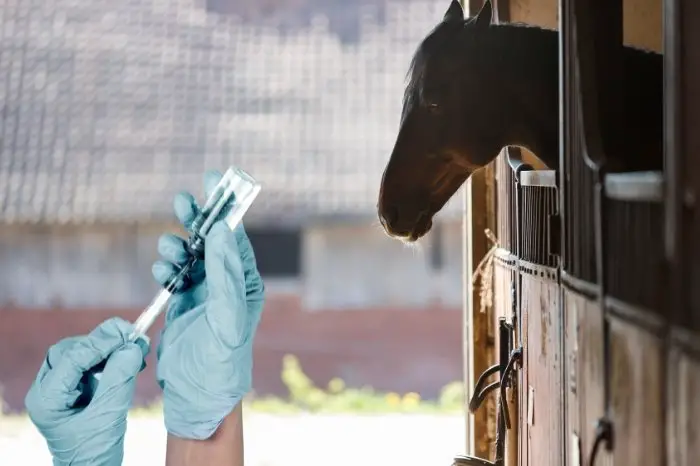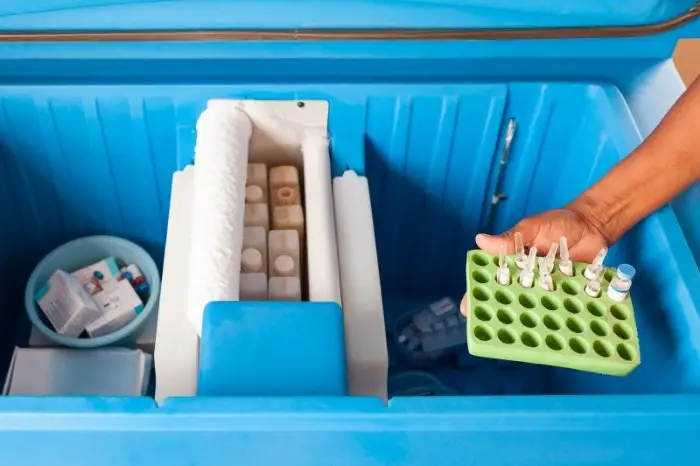Last Updated on July 24, 2022
Proper vaccine storage is vital in order for them to be safe and effective. So, why should refrigerated vaccines be stored in the middle of the refrigerator? It is always important to take care and know how to handle vaccines for your horses.
In most cases, it is best to have your veterinarian administer vaccines. However, most vaccines besides the rabies vaccine can be purchased and administered by horse owners. It is important to know how to properly store and administer a vaccine and where it should be given.
What Vaccines Do Horses Get?
Vaccinating your horse is very important in order to keep them healthy and protected from diseases. Vaccines can be broken up into two categories: core vaccines and risk-based vaccines.
Core Vaccines
Core vaccines are categorized by the American Association of Equine Practitioners (AAEP) as the vaccines every horse should receive. The core vaccines include rabies, West Nile Virus, tetanus, and EEE/WEE. They should be administered to horses regardless of age, gender and location.
Risk-Based Vaccines
Ris-based vaccines are given to horses depending on factors such as location, traveling, and odds of exposure, among other things. Common risked-based vaccines include equine influenza, strangles, Equines Herpesvirus (Rhinopneumonitis), Potomac horse fever, and botulism. Your veterinarian will decide if and what risk-based vaccines your horse may need.
How Often Do Horses Need To Be Vaccinated?
Most vaccines are given to horses annually, though some may be given twice a year depending on the vaccine. In addition, horses that are at higher risk or horses that travel often to shows may receive certain vaccines more frequently.
The core vaccines are given to horses once a year. Foals born from a vaccinated mare will generally receive their first shots at six to seven months of age. Boosters are generally administered at four to six-week intervals. After that, the horse will continue to receive the core vaccines on an annual basis.
When Do Horses Get Vaccinated?
Most horses get their vaccines in the fall. This is to help best prepare horses from mosquito-borne illnesses that are most likely to occur during the summer months. Some vaccines may also be given in the fall.
Horse Health Record Book: Horse Health & Activities Record Log Book, Vaccination & Veterinary Record
How To Administer Vaccines Yourself To Your Horse
Though the rabies vaccine must always be given by a veterinarian, other vaccines may be administered to horses by a skilled handler. The handler must know how to administer the vaccine to the horse and where it should be given. In addition, whoever is administering the vaccines must know how to properly store and handle them.
Though rare, some horses may have an adverse reaction to vaccines. If you are administering vaccines yourself, you should know what to do in a case of an emergency. It is also important to properly dispose of the needle and syringe after administering the vaccines.
Storing Vaccines
If you are going to administer a vaccine to your horse, it is very important to know how to properly store it. If your vaccine is not properly stored, it will no longer be effective. In addition to no longer being effective, it might also increase the rate of local reactions to vaccinations.
Vaccines must be properly stored at all times to keep them safe and effective to use for your horse. For some vaccines, a phenol red indicator is added to certain vaccines such as the West Nile vaccine to let you know if the vaccine has gone bad. Most will typically have a finished pH at a target of 7.1 to 7.4 and display as a pink indicator.

Bacterial contaminants can cause the indicator to change to amber or yellow (acidic) or brown (basic). When this happens, the vaccine is no longer good and must be properly disposed of.
Click Here to Get Info About:
Why Should Refrigerated Vaccines Be Stored In The Middle Of The Refrigerator?
Vaccines should generally be kept at a temperature between 35 to 45 degrees Farenheit. To ensure that the fridge stays at this temperature range, you should keep a thermometer in the fridge. Be sure to monitor the temperature in the fridge at least twice a day to make sure that there are no major temperature fluctuations happening.
The vaccines should always be stored in the middle of the fridge because that is the most consistent spot in the fridge temperature-wise. You should not store the vaccine on a shelf on the door of the fridge, as the temperature can become too warm. On the other hand, you don’t want to store the vaccine at the back of the fridge as it can become too cold.
If the vaccine gets too cold or too warm, it should be properly disposed of and not given to a horse. When transporting the vaccine, do not put it directly on an ice pack in a cooler. Instead, put bubble wrap or paper in between the vaccine and ice pack.

Properly Storing Vaccines For Your Horses
If you choose to administer vaccines to your horses, it is important to properly store them so they are effective. In addition, it is important to know how to properly administer vaccines to horses.
Do you have any questions regarding why should refrigerated vaccines be stored in the middle of the refrigerator? If so, please ask any questions regarding equine vaccines in the comments.

